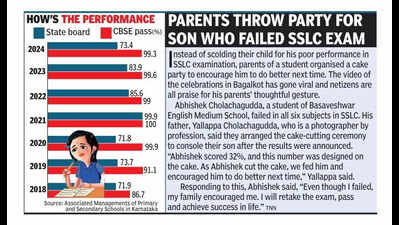Reduce pass mark, introduce dual levels for Maths: Associated Managements of Primary and Secondary Schools in Karnataka | Bengaluru News

Bengaluru: With yet another dismal SSLC performance by the state, the Associated Managements of Primary and Secondary Schools in Karnataka has proposed a series of policy-level reforms to improve the pass percentage.
The recommendations, submitted to the principal secretary Rashmi Mahesh, were derived after comparing the education system of states like Tamil Nadu, Telangana, Andhra Pradesh, Kerala, and Puducherry. The pass percentage in this year’s SSLC exam was 62.3%.
The association observed that the pass mark required in Karnataka is higher than that of the other states. While in Karnataka it is 35%, CBSE has it at 33%. In Kerala, it is 30%, with no separate paper minimum marks. In AP, students must score 35% in each subject except in Hindi (20%). Overall, 32.5% is required.
Most other states also have a blended model of internal and external assessment for student evaluation. In Telangana, 20 internal assessment marks exist for each subject. In Kerala, 130 marks are for internals and 520 for externals. In CBSE, 20 marks are for internal and 80 for the external exam, and a student needs to pass with 33% overall, including the internals. However, in Karnataka, a student must separately score 35% in the final exam as internal assessment is not counted.
Also, Karnataka is the only board where the first language is for 125 marks. The inflated marking scheme effectively means students have to tackle a heavier first language, adding to their burden, apart from studying two other languages, the report said.
The association recommended a dual exam option in Maths and Science. In CBSE, students have the option to choose between basic Maths and standard Maths, which accommodates diverse student learning needs. A similar system in Karnataka will reduce the burden on students. It also suggested formative assessments be introduced from grade 1 for continuous evaluation.
Another recommendation is to align the textbooks and curriculum to the National Council of Educational Research and Training textbooks. In 2017, an NCERT analysis pointed out that Karnataka textbooks focus on factual knowledge and definitions rather than fostering understanding. The review observed that the books are “loaded with more factual information which is difficult for a child of (that) class” and introduced technical terms meant for higher classes. Teachers in Karnataka have echoed these concerns, noting that some content in state textbooks is more challenging than even Pre-University level syllabi, it pointed out.
Improving teacher training and strengthening continuous and comprehensive evaluation are the other reforms suggested. It has also asked the govt to mandate all schools to take baseline and endline assessments based on common learning outcomes at key stages like grades 3, 5, and 8. The association has requested the govt to form a high-level committee on SSLC exam reforms immediately.
How’s the performance
Year— SSLC— CBSE
2024—73.4%— 99.3%
2023—83.9%—99.6%
2022—85.6%—99%
2021—99.9%— 100%
2020—71.8%—99.9%
2019—73.7%—91.1%
2018—71.9%—86.7%
















